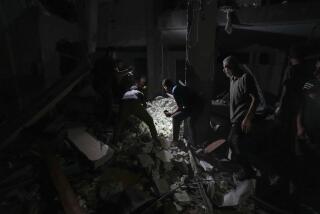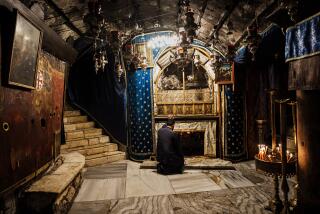Muslims and Their Leaders Denounce Church Attacks
- Share via
BAGHDAD — Shiite and Sunni Muslim leaders on Monday roundly condemned the bombing of five Christian churches -- here and in the northern city of Mosul -- that killed at least 11 people and prompted some Christians to consider fleeing the country.
If Sunday’s attacks were intended to divide the country, they appeared to be having the opposite effect. Ordinary Iraqis and religious leaders, including the most senior Shiite cleric, Grand Ayatollah Ali Sistani, urged national unity.
Meanwhile, a Lebanese hostage was rescued after Iraqi police raided his kidnappers’ hide-out in the town of Abu Ghraib, west of Baghdad. Talks continued Monday to secure the release of Jordanian, Indian and other hostages.
In the Shiite holy city of Najaf, followers of anti-American cleric Muqtada Sadr fired on U.S. troops, according to the U.S. military and Iraqi government sources. The incident occurred during a routine patrol in an area where the U.S. military says it is permitted to travel.
As the patrol drove past the Najaf Maternity Hospital, it came under attack from militants firing small arms, mortar rounds and rocket-propelled grenades. The Marines returned fire and killed two insurgents, the military said.
Local hospital officials said the firefight killed a woman and injured several civilians.
Sadr’s militia battled U.S.-led forces for two months this spring in Najaf, Kufa and Karbala. Najaf, where the worst of the fighting occurred, has been calm since an agreement restricting U.S. patrols to areas of the city away from its shrine.
As Christians throughout Iraq wrestled with Sunday’s church attacks, an unknown group claimed responsibility for the bombings and warned that more would follow. The statement, by an organization calling itself the Committee of Planning and Follow-up in Iraq, was posted on an Islamic website.
Mainstream Muslim groups were dismayed by the bombings. Sistani denounced the attacks as “outrageous” and “flagrant crimes.”
“It is necessary that the efforts of everyone -- the people and the government -- focus on being unified and cooperating ... to put an end to the aggressions on the Iraqis and to defeat the aggressors,” said a statement from Sistani’s office in Najaf.
“We emphasize the respect of the rights of the Christian citizens and other religious minorities ... to live peacefully in their country, Iraq,” the statement said.
The Assn. of Sunni Muslim Scholars, one of the most prominent Sunni bodies in the country, said the bombings were “totally remote from any religious or humanitarian norms.”
The group said it was completely out of character for Iraqis to commit such a crime, and it blamed “foreign” agitators.
U.S. military investigators said they were examining the forensic evidence and had not reached a conclusion about who carried out the attacks. They said the bombings carried the “signature” of extremists -- not Baathists, who would be unlikely to attack religious sites.
The investigators said they doubted that the attacks were the work of Abu Musab Zarqawi, the Al Qaeda-trained fugitive who has claimed responsibility for several recent suicide bombings. His attacks generally are more devastating, the investigators said.
At St. Peter’s Seminary, a Chaldean church, where the death toll rose to seven after the burned bodies of two people were found in their cars, Christian and Muslim neighbors said they were still dazed by the blast.
“We felt very sad when this incident happened as it is unprecedented. We have not witnessed such things even during the war,” said Haider Yousif, 20, who lives across from the church’s main gate. “I felt happy when I heard the statements given by the Christians in which they ruled out the idea that Muslims were responsible for such a deed.”
In a gesture of support, a local glass merchant offered to sell replacement windowpanes at wholesale prices to anyone whose house or business had suffered damage.
As some Christians discussed their options for leaving the country, others insisted they would stay because Iraq is their home. “My family would not think of leaving Iraq because of these attacks
It is difficult for Iraqis to leave the country. They must secure visas and enough money to support themselves until they find work. A number of Christians have fled to Syria in recent months, hoping it would be easier to obtain visas to Australia and Canada from there.
On Monday, senior Sunni clerics protested the detention of a colleague, Muthanna Dhari, by U.S.-led forces. Dhari is from one of the most influential Sunni families in Iraq.
U.S. military sources said the sheik was believed to be connected to an attack Sunday on American troops. They said his fingers had tested positive for explosives.
However, the Sunni clerics association insisted that immediately before his arrest, he was recording a program on the Lebanese Broadcasting Corp.’s satellite channel and could not have been involved in an attack.
*
Times staff writer Mark Mazzetti, who is with the U.S. military command at Camp Victory in Baghdad, and special correspondents Raheem Salman, Suhail Hussain and Saif Rasheed contributed to this report. Times wire services also were used.
More to Read
Sign up for Essential California
The most important California stories and recommendations in your inbox every morning.
You may occasionally receive promotional content from the Los Angeles Times.













